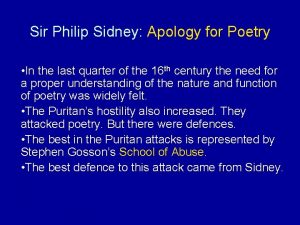Internet Meme Sir Philip Sidney is not amused

- Slides: 1

Internet Meme: Sir Philip Sidney is not amused Smart Phone Application: Sexy Sidney Renaissance Pickup Lines Twitter: @Sidney. Circle Website: International Sidney Society Thanks to the Internet, the term "meme" has exploded in popularity, adopted by today's youth, and generally refers to images generated for Internet circulation. Popular Internet memes run the gamut from "rage comics" to animals given college majors (English Major Armadillo, Science Major Mouse, Psychology Student Platypus, et al) and stereotypes dedicated thereto. This project used an Internet meme—titled “Sir Philip Sidney is not amused”—and disseminated it through various means, including Tumblr and Facebook. The meme is fairly successful, with 225 followers as of 22 March 2012, an average of 67 notes per meme, and some posts acquiring almost 400 notes. It can be found at sirphilipsidneyisnotamused. tumblr. com. This smart phone application features quotes from Sir Philip Sidney’s Astrophil and Stella made into pickup lines. It was created using the i. Build. App website (ibuildapp. com). Twitter is "a real-time information network" that allows users to connect to things they find interesting by "following" other accounts, such as friends, celebrities, news sources, and various “joke” accounts (Lord Voldemort, for instance). Posts are in the form of 140 -character “tweets” and can be comprised of anything from photos and videos to conversations and thoughts. The International Sidney Society website features not only information pertinent to members of the International Sidney Society, but also contains references which are useful for scholars of Renaissance-era literature, whether the scholar in question is a student, a professor, or merely someone interested in the subject. The website was created using Dream Weaver software using HTML programming language. Version 1. 0 is currently available for free through the Android Market. Abstract: Most know the Renaissance Era in England best for prolific playwrights and poets such as William Shakespeare. However, there a great many others just as deserving of praise and attention from this period of revival and renewal of the literary arts. Many Renaissance authors, especially those in the Sidney Circle (Sir Philip Sidney; his sister, Mary Sidney Herbert, Countess of Pembroke; his niece, Lady Mary Wroth; and his brother, Sir Robert Sidney), are experiencing a renewal of scholarly interest in their works. Using technology and new media, the Sidney Circle can be given a new renaissance, bringing them into the Twenty-First Century and out of the "dark ages" by making these talented poets more accessible to the younger generation. Aspects of this project include the remaking of the International Sidney Society web site and the creation of a smart phone application, a Sir Philip Sidney Twitter account, and an Internet meme. Together, these elements should make this family of authors far more accessible and relatable to a generation that would typically be more inclined to let them fall to the wayside, while likewise providing a set of tools by which scholars of English literature can better access ongoing discourse regarding the Sidney Circle. The Twitter account created for this project, @Sidney. Circle, features quotes and “food for thought” from the members of the Sidney Circle of English Renaissance poets. The Twitter page updates once a week with a different quote and is currently featuring Sir Philip Sidney’s Astrophil and Stella. Introduction: ØNew media has played a vital role in education since the 1980 s. Educational tools that utilize new media range from online and CD-ROM versions of textbooks to educational games. ØIt has long been accepted that having fun is one of the best ways to encourage the learning process in children and adults. The majority, if not all, of the web sites for television channels and shows have sections with games geared towards educating children in math, science, reading, and language, among other subjects. Doing a web search for “educational games” reveals a multitude of sites dedicated to learning made “fun”. ØThe term “meme” was coined by Richard Dawkins in 1976 book The Selfish Gene and is, according to The Oxford English Dictionary, “[a] cultural element or behavioural trait whose transmission and consequent persistence in a population, although occurring by non-genetic means (esp. imitation), is considered as analogous to the inheritance of a gene. ”

